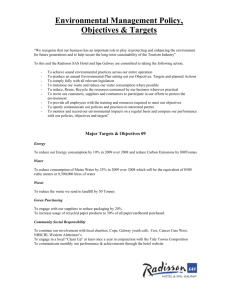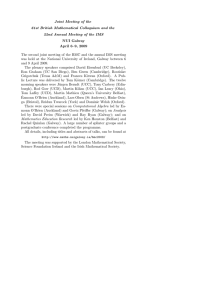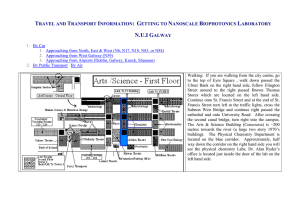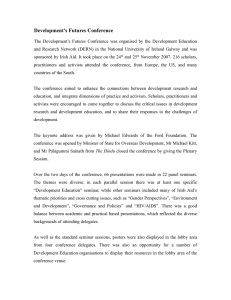Guest Speakers’ Biographies
advertisement
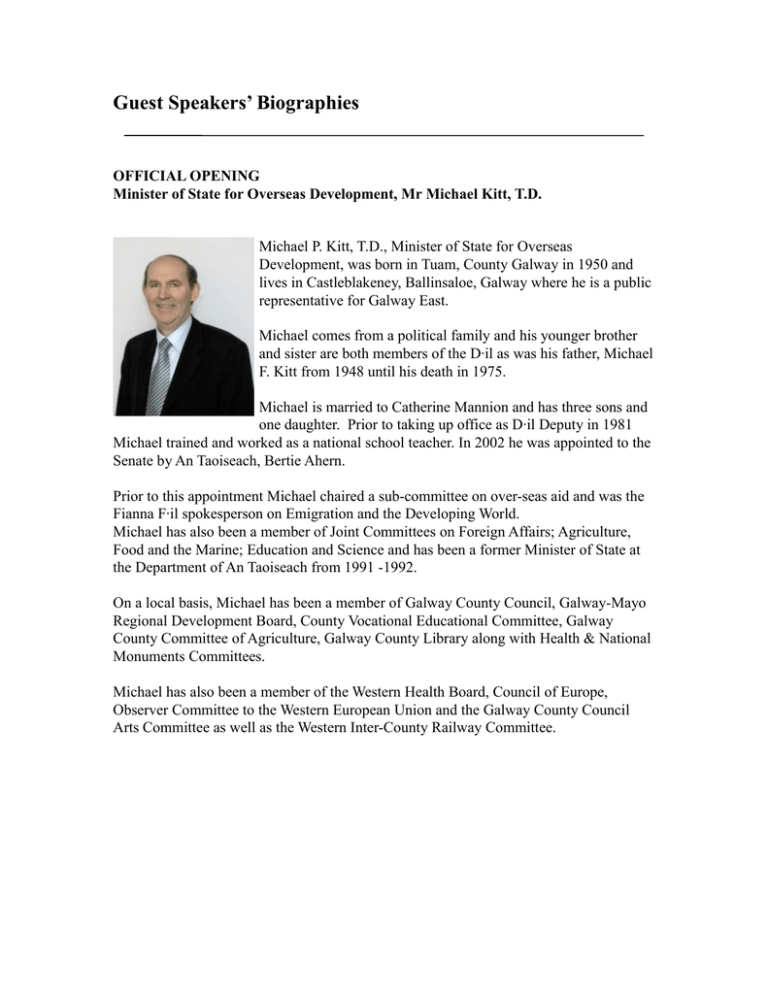
Guest Speakers’ Biographies OFFICIAL OPENING Minister of State for Overseas Development, Mr Michael Kitt, T.D. Michael P. Kitt, T.D., Minister of State for Overseas Development, was born in Tuam, County Galway in 1950 and lives in Castleblakeney, Ballinsaloe, Galway where he is a public representative for Galway East. Michael comes from a political family and his younger brother and sister are both members of the Dáil as was his father, Michael F. Kitt from 1948 until his death in 1975. Michael is married to Catherine Mannion and has three sons and one daughter. Prior to taking up office as Dáil Deputy in 1981 Michael trained and worked as a national school teacher. In 2002 he was appointed to the Senate by An Taoiseach, Bertie Ahern. Prior to this appointment Michael chaired a sub-committee on over-seas aid and was the Fianna Fáil spokesperson on Emigration and the Developing World. Michael has also been a member of Joint Committees on Foreign Affairs; Agriculture, Food and the Marine; Education and Science and has been a former Minister of State at the Department of An Taoiseach from 1991 -1992. On a local basis, Michael has been a member of Galway County Council, Galway-Mayo Regional Development Board, County Vocational Educational Committee, Galway County Committee of Agriculture, Galway County Library along with Health & National Monuments Committees. Michael has also been a member of the Western Health Board, Council of Europe, Observer Committee to the Western European Union and the Galway County Council Arts Committee as well as the Western Inter-County Railway Committee. KEYNOTE SPEAKER Mr Michael Edwards, Ford Foundation Michael Edwards is the Director of the Governance and Civil Society Program at the Ford Foundation in New York, one of the world’s largest philanthropies with assets of approximately US$10 billion. Prior to joining the Foundation he was the Senior Civil Society Specialist at the World Bank in Washington DC, where he led a programme designed to improve the agency's understanding of, and engagement with, a wide range of civic groups. Before moving to the Bank, Michael spent 15 years as a senior manager in international relief and development NGOs, including periods with Oxfam-UK (as Regional Director for Southern Africa), and Save the Children-UK (as Director of Research, Evaluation and Advocacy). His many books and articles have helped to shape our thinking about NGOs, civil society and international cooperation. He is the author (most recently) of NGO Rights and Responsibilities: a new deal for global governance (Foreign Policy Center 2000), Global Citizen Action (Lynne Rienner 2001), the Earthscan Reader on NGO Management (Earthscan/Stylus 2002), Civil Society (Polity Press/Blackwell 2004), and Future Positive: International Cooperation in the 21st Century (revised edition, Earthscan/Stylus 2004). Michael graduated from Oxford University with a congratulatory double-first and was awarded a PhD by the University of London for his work on low-income housing in Latin America. PLENARY SPEAKER Palagummi Sainath Palagummi Sainath has worked as a journalist reporting on development and related issues in India for 26 years. He has won over 30 national and international journalism awards and fellowships, his most recent being the Ramon Magsaysay award in 2007 for journalism, literature, and creative communications arts. He has also won Amnesty International's Global Human Rights Journalism prize (2000) and (with CNN's Jim Clancy) the United Nations Food and Agriculture Organization's (FAO) Boerma prize for work of 'international importance in addressing the issues of hunger.' In November 2002, he became the first print media journalist to win the 'Inspiration Award' at the Global Visions Film Festival in Edmonton, Canada (with film maker Joe Moulins). The first working journalist to win India's Jawaharlal Nehru Fellowship, Sainath is also a winner of the BD Goenka prize for Excellence in Journalism, and has also been an Eisenhower Fellow. Sainath's book, 'Everybody Loves a Good Drought' (1996), has gone into 19 printings and has been translated into a number of languages. In the last decade, he has spent on average three quarters of the year with village people, reporting extensively on agrarian crises due to neo-liberal policies, on the lack of sensitivity and efficiency by the government and the bureaucracy, on farmer suicides in Maharashtra, Andhra Pradesh and Kerala and also reported on the plight of the dalits. Sainath's strength lies in his energy as an investigator, the rigour of his research and the lucidity of his prose. A fine photographer and public speaker, he is currently the Rural Affairs Editor of India's most serious English language daily, The Hindu, of Chennai. The eminent Indian journalist Nikhil Chakravartty once described Sainath's work as "the conscience of the Indian nation." His work on poverty, hunger and inequality has also won praise from the likes of Nobel Laureate Amartya Sen who once described him as one of the world's great experts on hunger and famine. Sainath is actively involved in the training of journalists in the poorest regions of India's countryside. He has also been teaching journalism at the Sophia Polytechnic in Mumbai for 20 years. Many of Sainath's students have themselves gone on to win major national awards.
